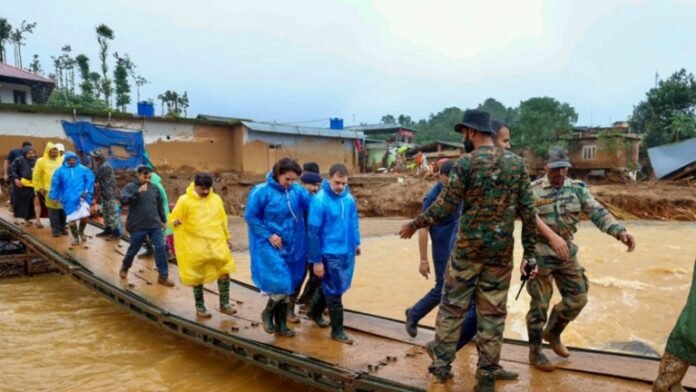Congress leaders Rahul and Priyanka Gandhi met with victims of the recent devastating floods that have wreaked havoc in the region. During their visit, the siblings recalled the tragic death of their father, former Prime Minister Rajiv Gandhi, evoking an emotional response from both the victims and the public. However, their visit has also drawn sharp criticism from the Bharatiya Janata Party (BJP), which has labeled the trip as “tragedy tourism.”
The Visit to Wayanad
Rahul Gandhi, who represents Wayanad in the Lok Sabha, and his sister Priyanka Gandhi Vadra, took time to meet with families affected by the floods that have caused widespread destruction in the district. The Gandhis toured the affected areas, spoke with survivors, and assured them of support. They listened to harrowing stories of loss and displacement, offering empathy and pledging aid to help the community rebuild.
During their visit, Rahul and Priyanka spoke about the personal loss they experienced when their father was assassinated in 1991. They drew parallels between their grief and the suffering of the flood victims, emphasizing the importance of compassion and solidarity in times of crisis. Their heartfelt interactions and emotional recollections struck a chord with many, highlighting the personal connection Rahul Gandhi has with his constituency.
Recalling Rajiv Gandhi’s Legacy
The visit to Wayanad also served as a moment for Rahul and Priyanka Gandhi to reflect on their father’s legacy. Rajiv Gandhi, who was assassinated by a suicide bomber in 1991, left a lasting impact on Indian politics and the Congress party. Rahul and Priyanka’s recollections of their father’s death were not only a tribute to his memory but also a reminder of the enduring pain of losing a loved one to violence.
Rahul Gandhi mentioned how his father’s death has influenced his political journey and commitment to public service. He spoke about the resilience required to overcome such a profound personal tragedy and how it motivates him to serve the people of his constituency with dedication and compassion. Priyanka Gandhi echoed these sentiments, underscoring the importance of empathy and support in the face of adversity.
BJP’s Criticism: ‘Tragedy Tourism’
Despite the emotional tone of their visit, the Bharatiya Janata Party (BJP) criticized the Gandhis, accusing them of engaging in “tragedy tourism.” BJP leaders claimed that the visit was a politically motivated attempt to garner sympathy and publicity rather than a genuine effort to aid the victims. They argued that the Gandhis were exploiting the suffering of the flood victims for political gain.
BJP spokespersons emphasized that real support should come through concrete actions and policy measures rather than symbolic visits. They pointed out that the central government, led by Prime Minister Narendra Modi, has been actively involved in relief efforts, providing financial aid and resources to help the affected regions. The BJP’s critique highlighted the ongoing political rivalry between the two parties, casting a shadow over the Gandhis’ visit.
Public Response and Media Coverage
The public response to the Gandhis’ visit has been mixed. Supporters of the Congress party praised Rahul and Priyanka for their empathy and for taking the time to personally connect with the victims. Many appreciated their efforts to bring attention to the plight of the flood-affected families and their commitment to providing assistance.
However, the BJP’s allegations of “tragedy tourism” have found resonance among some sections of the public, who are skeptical of the motives behind the visit. The media coverage has been extensive, with news channels and social media platforms debating the sincerity and impact of the Gandhis’ actions. The polarized opinions reflect the deeply entrenched political divisions in the country.
The visit of Rahul and Priyanka Gandhi to Wayanad, marked by emotional recollections of their father’s death, has drawn both sympathy and criticism. While their interactions with the flood victims highlight their personal commitment to their constituency, the BJP’s accusations of “tragedy tourism” underscore the political tensions surrounding the visit. As the region continues to recover from the devastating floods, the focus now shifts to the tangible support and aid that can help rebuild the lives of those affected.

